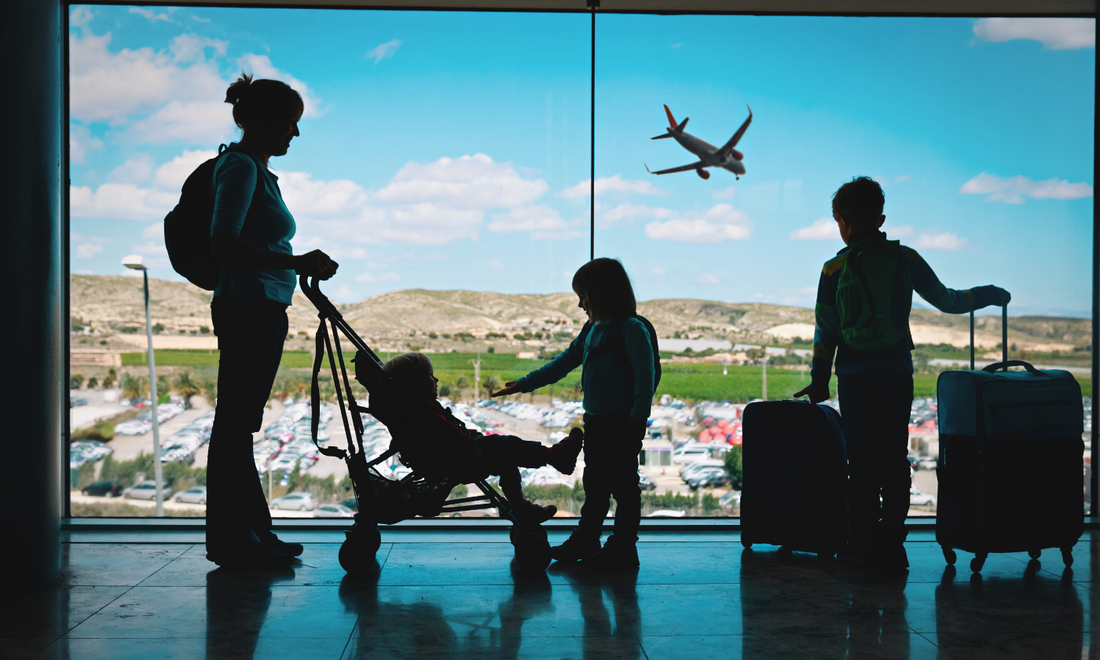
5 Hidden Travel Rules That Could Spoil Your Family Holiday
Share
Family travel, particularly when flying with children, can present its challenges and so encountering unexpected hurdles is the last thing you want. That’s why it’s important, to be aware of travel regulation.
However, there are some regulations hidden in the small print that often catch even the most seasoned travellers off guard. We've compiled a list of lesser-known hurdles, accompanied by actionable tips. This way, you'll be well-prepared to tackle any situation that comes your way during your family journey.
1. Navigating Name Verification at Border Control
Border control policies can pose challenges for parents travelling with children who have different surnames. Many countries have stringent measures in place to safeguard against child trafficking, which may result in questioning and additional document requests to establish the parent-child relationship.
For example, in the United States, if a child is travelling with only one parent or someone who is not their parent, the accompanying adult should carry a notarised letter of consent from the child's parent(s) stating permission to travel internationally. Similarly, Canada Border Services Agency (CBSA) suggests that when a child is travelling with only one parent or someone who is not their parent, a letter of authorisation from the absent parent(s) is recommended.
Tips:
- Carry appropriate documentation to verify your relationship with your child, such as a birth certificate, adoption papers, or legal custody documents
- Obtain a letter of consent from the other parent if you are travelling alone with your child and share custody. Some countries may require this letter to be notarised or have specific content requirements
- Stay informed about the destination country's border control prerequisites to prevent unexpected delays or complications. Some countries may necessitate specific forms or procedures for families with children

2. Restrictions on Travelling with Infants
Some airlines impose specific restrictions when travelling with infants and this can vary depending on the carrier and destination. For example, British Airways requires infants to be at least 48 hours old to fly, provided they are born without complications, while Lufthansa allows one baby per adult passenger unless a second baby can be carried in an "appropriate child restraint system" and occupies an extra, booked seat. Understanding these rules will help you put the necessary arrangements in place to ensure a comfortable journey.
Tips:
- Contact the airline directly to book tickets for infants. Some airlines may not offer online booking for infants, requiring parents to make reservations through their customer service
- Contact the airline about seating options and bassinet availability when booking tickets. Many airlines provide bassinets for infants on long-haul flights, but they may be limited in number and require early booking
- Be mindful of age restrictions for newborns allowed on flights. Some airlines have minimum age requirements, such as 48 hours old, for infants to travel
- Check the airline's policy on the number of infants allowed per adult. Some carriers may have restrictions on the number of infants that can travel with one adult passenger
3. The Two-Year Limit and Beyond
When travelling with young children, particularly those under two years old, there are some considerations you may wish to keep in mind, especially if the child's second birthday falls during the travel period. On British Airways, your child will be entitled to their own seat on the return journey, and the good news is that the airline won't impose an additional charge for this upgrade. However, Scandinavian Airlines follows a different policy, requiring a child ticket to be booked for both the outbound and return flights.
Tips:
- Inform the airline in advance if your child will turn two during the travel period. Some airlines require a separate seat for children over two, and early notification can help secure proper seating arrangements for the return journey
- Familiarise yourself with the airline's child ticket booking policies. Some airlines may require booking a separate ticket for children who turn two before the return flight, while others may not charge for this upgrade

4. Parents with Divorced or Separated Status
Nowadays, travelling with children is more common than ever, even for divorced families. However, for divorced parents, just packing up and heading out the door is not likely how you’ll be able to go about travelling with your children. In a divorced or separated family situation, travelling with a child requires additional planning and communication. Legal requirements and potential complications should be taken into account to avoid any issues during the journey.
Tips:
- Obtain written consent from the other parent before travelling with your child outside the country. This step is crucial, as failure to do so may lead to legal complications, especially if both parents share parental responsibility
- Inform the other parent about the travel plans, even if there is no legal requirement to do so. Clear communication can help prevent misunderstandings and ensure both parents are aware of the child's travel arrangements
- If you have shared parental responsibility, consider discussing the travel plans with the other parent, regardless of whether consent is legally required. Open communication can help maintain a positive co-parenting relationship and avoid potential conflicts
- For grandparents or other relatives travelling with the child, ensure they carry written permission from both parents, even if they have a different surname than the child. This documentation can be useful in case of any border control queries or legal inquiries during the trip
5. Passport Requirements for Children
Navigating passport regulations for children is crucial when planning your family's travel, especially for international flights. While domestic flights might not necessitate a passport, international travel demands that each child has their own valid passport.
Tips:
- Ensure your child has a valid passport before booking airline tickets for international travel
- Allocate sufficient time for the passport application process and consider the age requirement for parental presence during application
- In the majority of cases, children under 16 years of age will need a parent or legal guardian to accompany them when applying for a passport

6. Preparation and Knowledge
Being well-prepared and knowledgeable about airline policies and destination country regulations is essential to ensure a stress-free family travel experience. Earlier this year, a couple boarding a Ryanair flight left their baby at check-in after refusing to pay the unexpected ticket cost. Conducting thorough research can significantly contribute to a smoother journey.
Tips:
- Research and familiarise yourself with the specific air travel rules and policies of the airlines you are flying with and the destination country. This includes age restrictions for infants and children, baggage allowances, and any specific documentation requirements.
- Check the airline's health-related guidelines, especially if you have recently undergone a medical procedure or if you are travelling while pregnant. For example, some airlines may require medical clearance after a caesarean section, or they may have restrictions on pregnant women flying during the late stages of pregnancy.
- Always carry essential documents, such as passports, birth certificates, and any required parental consent letters. These documents are essential for border control and any unexpected situations that may arise during the trip.
- Consider travel insurance that covers unforeseen circumstances, such as trip cancellations, flight delays, or medical emergencies. Having adequate insurance can provide peace of mind and financial protection during your family vacation.
- Stay informed about any travel advisories or safety updates for your destination. Check with your country's foreign affairs department or official travel websites for up-to-date information on travel alerts and warnings.
Conclusion
So, there you have it – the lowdown on those sneaky travel rules that might catch you off guard during your family adventure. But fear not! Armed with these insights and a dash of proactive planning, you can breeze through your trip without any unexpected hiccups. With just a bit of documentation know-how and a sprinkle of pre-trip prep, you'll be all set to get your family trip off to a good start.
